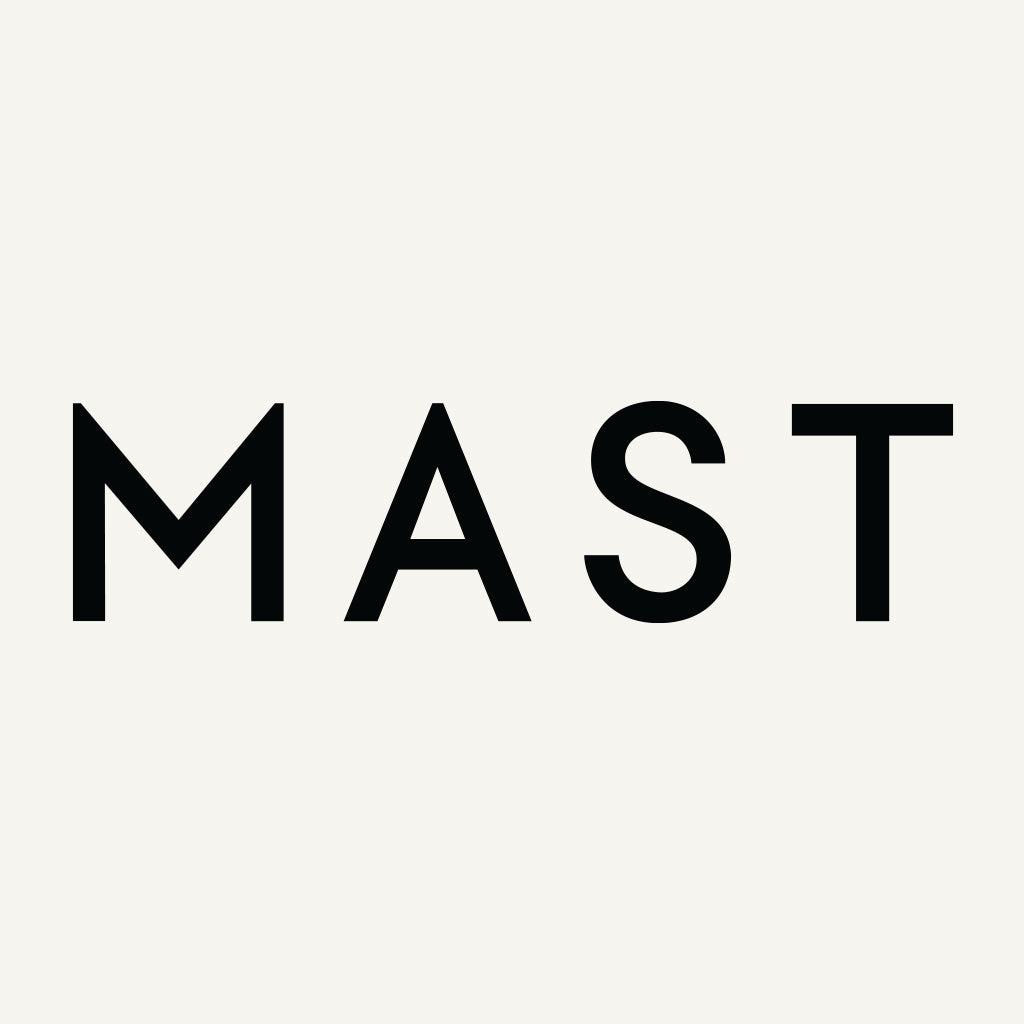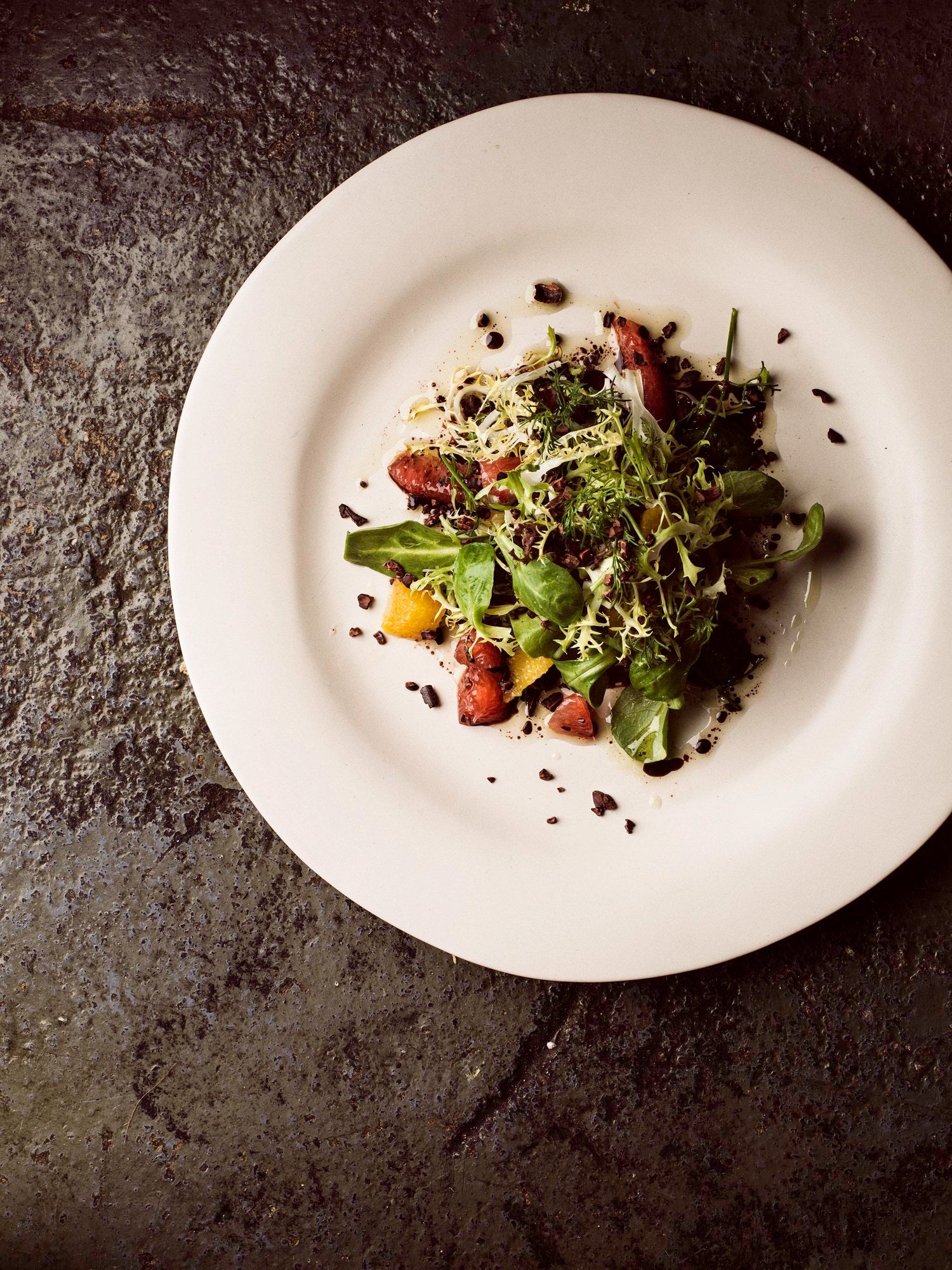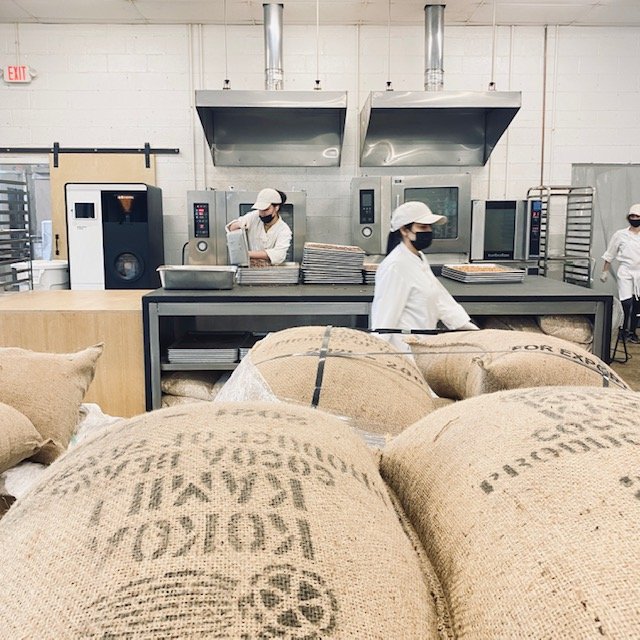Going Electric
Investing in sustainable practices is essential — this Earth Day and every day. We are proud to partner with a community of farmers, artisans, and organizations who prioritize sustainability and push their industries forward through leading by example. Whether conserving water through drip irrigation, using solar tables and wind generators for energy, or building organic soil through cover crops, our collaborators are doing incredible things to nourish both land and people.
This brings us to our relationship with Bellwether Coffee: the creators of the first zero emissions, all-electric roaster. Check out said beauty below, which we proudly sport in our Mount Kisco, NY location where we roast all of our organic coffees in small batches. Here's a glimpse of it in (serene) action, too.
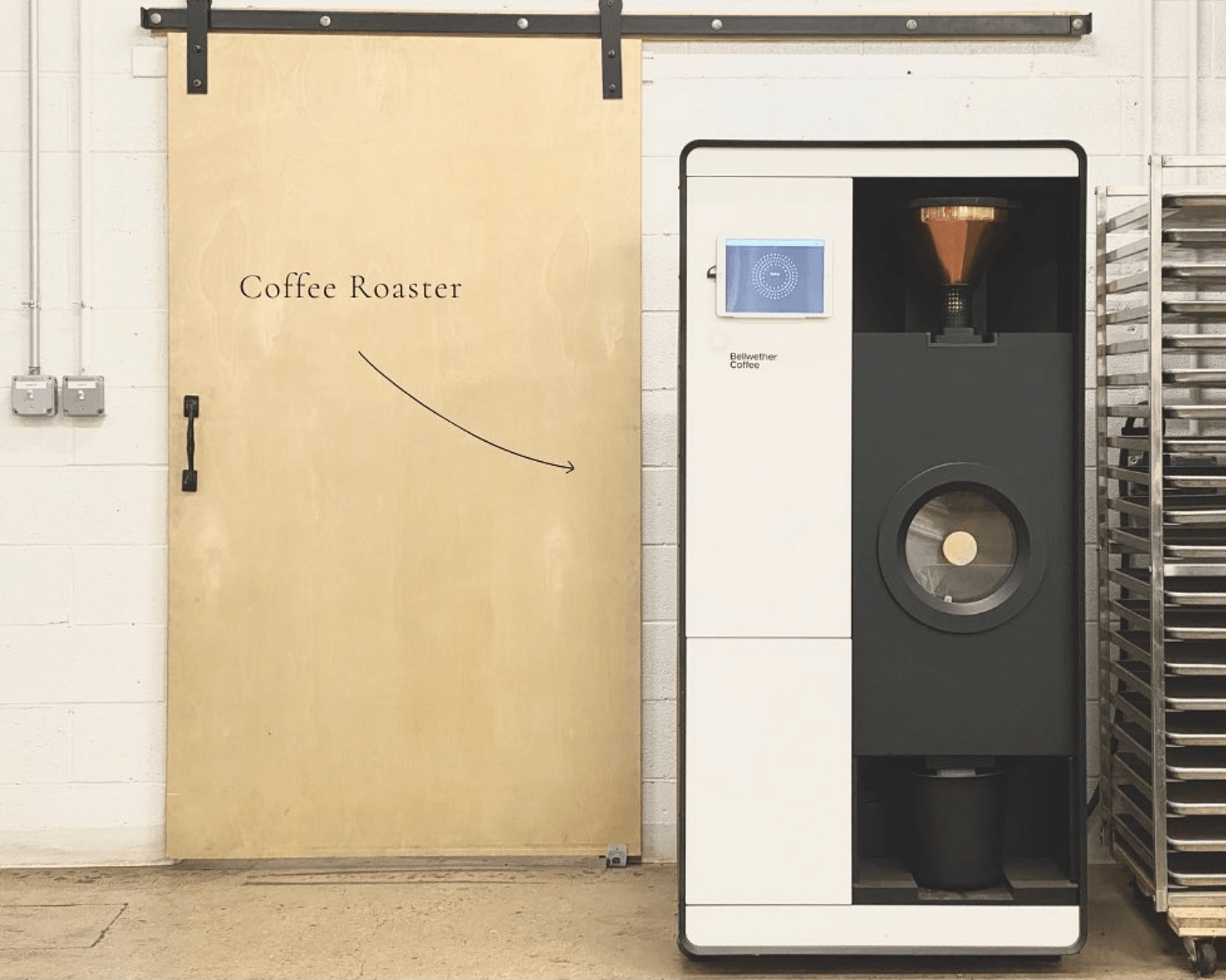
Bellwether Coffee Roaster at Mast Market.
We love the ability to experiment with and modify roasting profiles across our various blends and single origin, organic coffees. We've been able to achieve consistent and delicious results batch after batch. Not only that, but roasting accounts for about 15% of coffee’s overall carbon footprint; thanks to Bellwether, we can now reduce that part of the equation with ease.
Mast Journal's Amelie Yeager recently sat down with Bellwether’s Head of Sustainability & Impact, Grayson Caldwell. Prior to joining Bellwether in 2019, Grayson spent time in the Dominican Republican working for the Peace Corps, she received her MPA in Development Practice from Columbia, and, believe it or not, she wasn’t that keen on coffee growing up.
Enjoy our conversation with Grayson below.

Mast Journal: I read a bit about your background — how did you wind up working in the Peace Corps?
Grayson: Funny enough, I was pre-med when I went to undergrad. I wanted to do Doctors Without Borders — I didn’t know that International Development was a field. So I found myself in an organic chemistry class, and I was like, do I really want to do two more years of these classes, then med school, then residency — it’s like 15 years before I get to do Doctors Without Borders! So I took an Intro to Global Affairs class and realized oh, what I actually want to do is international development. Separately, in my Spanish class, this woman from the Peace Corps in Malawi came and spoke to us, and I had actually just spent the previous summer in Malawi. She walked in and spoke in Chichewa and said “Hi, how are you?” And I responded in Chichewa, “I’m well, how are you?” And she gave me a look like, what is going on? So we spoke about the Peace Corps, and it just sounded like such an incredible opportunity to experience grassroots development firsthand and to be able to integrate yourself into a community. And it was.
Mast Journal: This might be a chicken or the egg kind of question, but what came first professionally: your interest in coffee, or your interest in sustainability?
Grayson: Sustainability came first, but on a personal level I’ve had quite the journey with coffee. In my Peace Corps community we grew coffee, so it was very much part of our daily lives of drying the beans on the front patio, turning them, roasting them on a big open fire, milling them. I knew I wanted to work at the intersection of sustainability and global food systems, and in graduate school, one of my first assignments was to do a value chain analysis of a commodity of our choosing. I thought, well, I like coffee and I have some tangential experience growing it. So I did it, and I was instantly hooked. I think working in coffee is like working in quicksand.
Mast Journal: Coffee is so intensely personal and our relationships with it really evolve over time. Could you talk about your personal history with coffee, and how that’s been influenced by coffee being your profession?
Grayson: Ooh, fascinating. Growing up, my mom didn’t drink coffee, and my dad drinks coffee but…even now, I’ll send my dad nice bags of coffee, and I’ve set up a very nice coffee system for him. But, honestly, his coffee is unpalatable. His ratios are all off, it tastes like tar. So I would pretend to drink coffee in high school, but I never really liked it. I’d say the Peace Corps was the time in my life when I got very into drinking it. [In the Dominican Republic], they do a shot of espresso with a tablespoon of sugar in it. And you’d have twelve of those throughout the day. Eventually I was like, I can’t be drinking this much sugar. So I transitioned to just black coffee, and working at Bellwether, my tastes have completely changed again. I work really closely with the coffee team, so they have opened my eyes to natural coffees and lighter roasts, and I’ve become very particular. Now, honestly, I’d rather not drink coffee than drink a bad cup of coffee.
Mast Journal: Couldn’t agree more. So what’s your go-to setup at home?
Grayson: One of my colleagues set up my system at home. I do a pour over with a Kalita Wave, and I have a fancy burr grinder. It’s very fun.
Mast Journal: Could you tell me about your zero emissions roaster, and what went into developing it?
Grayson: The way our roaster works compared to a traditional roaster is that it’s all electric. A traditional roaster is powered by natural gas. With our closed-loop system, you’re using the same air and the same heat, batch after batch. Also, it’s the size of a refrigerator, it’s on wheels, you can roll it into your coffee shop. We push all of the roaster profiles to your machine based on the coffees that you’re purchasing, and it’s just so simple. With traditional roasters, these machines are huge, they need ventilation, they need permitting. The other day, I went to this coffee shop in my neighborhood who had an in-house roaster, but they couldn’t roast on it yet because they’ve been waiting six months for a permit. So the ease of it is often the most mind-blowing part.
Mast Journal: Wow. When you’re in situations like that, is it hard not to start spouting all this knowledge, or, ‘There’s a better way!’
Grayson: Totally. For better or for worse, I always have my sustainability hat on. And our roaster reduces the carbon footprint of roasting by 87% compared to natural gas roasters. So it’s hard not to be like, “You know, there are better and more environmentally friendly ways to produce the exact same result!”
Mast Journal: Hand in hand with sustainability, Bellwether is tackling farmer equity issues. What do you wish people knew more about this side of coffee?
Grayson: We as the coffee industry have indicated to consumers that they are paying the right price for coffee. And if you’re paying $5 for a latte, it’s hard to be confronted with the fact that somewhere in that supply chain, people are being paid unfairly. So, the industry really hasn’t done enough to show the data to back that up. Farmers are still bearing the brunt of low prices, on top of the supply chain constraints everyone else is facing. I’d encourage any consumer to get curious and dig a little deeper into where their neighborhood coffee shop is purchasing coffee, and whether those farmers are getting paid a fair price.
Mast Journal
Along those lines, could you talk about your Verified Living Income program?
Grayson: We have two impact programs which are focused on pricing. Verified Living Income is our North Star metric for our green coffee buying program. It flips traditional pricing methodologies on their head and looks at the cost of production, the average price local families need to earn for education, housing, clothing, and a nutritious diet. So it’s not just covering the costs of production, it sets a minimum price level to enable producers to reach a living income. And that’s something we’re replicating across all of our supply chains.
So, we pay a living income-based price, then we make a balloon payment to producer groups through our Tip the Farmer program where they’re able to invest in whatever their community needs are. That could be second payments back to producers, or a co-op in Colombia used it to buy PPE for all of their health care workers, in Guatemala they’re doing a dental hygiene program for the female producers, Peru did a food security project where they built gardens and bought small animals. It’s really based on what the community needs.
Mast Journal: So, this is our Earth Day issue. What keeps you optimistic about the future in terms of climate technology and sustainability?
Grayson: It’s hard — but I’m not a cynic. I’m optimistic to a fault, probably. I like to look at sustainability holistically, which I don’t think is the common approach. So Earth Day, it’s a sustainability day, but it’s very environmentally focused. But the way I think about it is that all these things have to happen together. Take these coffee farmers — they’re already fantastic stewards of their land. Imagine what they could do if they had more resources to invest in those lands! All of these things can happen in tandem to have a thriving industry.
Mast Journal: What’s your favorite part about what you do?
Grayson: The people. I feel very lucky that I’m able to meet amazing people around the world who work in coffee, or sustainability in general. They’re people who want to change the status quo for the better. It’s amazing to have thought partners who are so forward-thinking and motivating.
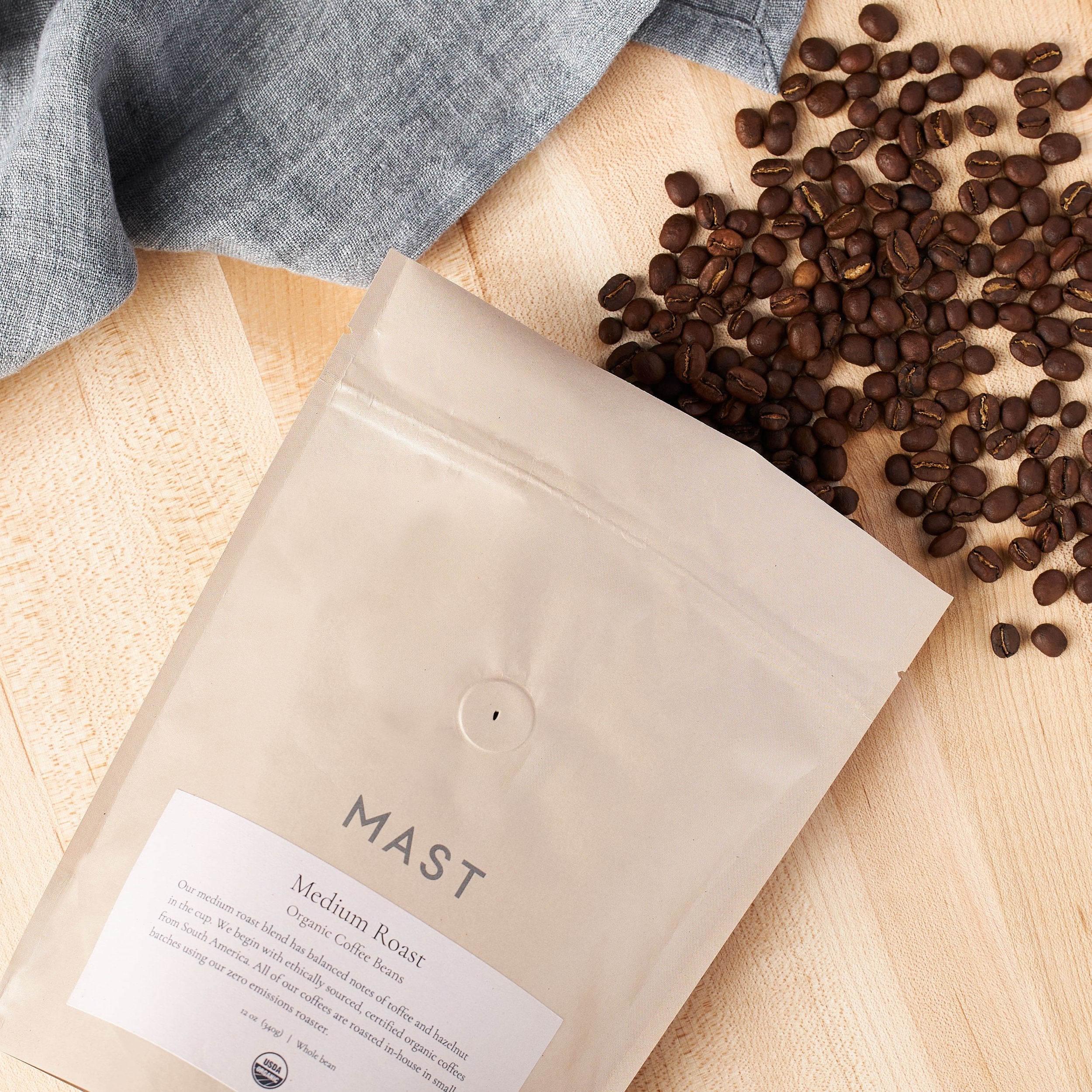
Medium Roast Organic Coffee roasted by Mast
Through emission-free roasting, using organic, non-GMO, biodegradable, and compostable packaging, and employing zero-waste production systems, caring for the earth is critically considered in everything we do. It's an ongoing education, and we look forward to expanding our efforts and doing what we can to create a healthier planet from the inside out.
With gratitude,
The Mast Journal
